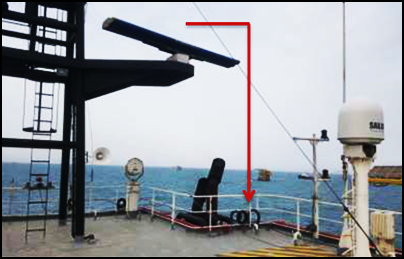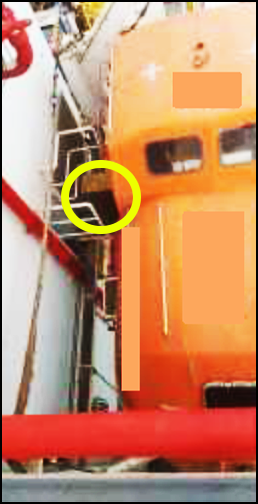-
What happened?
Two subcontractors were onboard a vessel to install a new electronics board in a radar antenna.
The job was completed safely. One engineer went back to the monkey island to collect missing tools.
The engineer was unable to find the tools, so checked the mast itself.
At the same time, the captain and the second engineer operated the radar for a final test.
The radar antenna rotated and hit the engineer.
He lost balance and fell from the mast to the deck, landing on the roof of a fibreglass lifeboat.
The engineer suffered multiple fractures, requiring surgery.

-
Why did it happen?
The engineers mislaid equipment – insufficient job preparation and completion of checklists.
When going back to check for the missing equipment, the engineer:
- Was not wearing personal protective equipment (PPE) such as fall protection.
- Had not ensured that energy was isolated.
- Had not confirmed that the lock out/tag out and permit to work (PTW) were still active.
Poor communication and coordination between the engineers and the captain.
- Vessel master and second service engineer were not informed that the first engineer went back up onto the monkey island.

-
What did they learn?
Improve communication and coordination between all workers (subcontractors, vessel crew etc.).
When preparing for a job, take special care to identify and mitigate risks.
Ensure all workers are thoroughly monitored during work, especially in dangerous areas.
Ensure all workers have a good safety culture.

-
Ask yourself or your crew
How do you ensure that you never leave equipment/tools on a job site?
What else can go wrong during radar antennas installation/maintenance?
How do you communicate and properly coordinate with other teams working on site at the same time as you? What more could you do?
What is your company’s safety culture like? How can we improve?

Add to homescreen
Content name
Select existing category:
Content name
New collection
Edit collection
What happened?
Two subcontractors were onboard a vessel to install a new electronics board in a radar antenna.
The job was completed safely. One engineer went back to the monkey island to collect missing tools.
The engineer was unable to find the tools, so checked the mast itself.
At the same time, the captain and the second engineer operated the radar for a final test.
The radar antenna rotated and hit the engineer.
He lost balance and fell from the mast to the deck, landing on the roof of a fibreglass lifeboat.
The engineer suffered multiple fractures, requiring surgery.

Why did it happen?
The engineers mislaid equipment – insufficient job preparation and completion of checklists.
When going back to check for the missing equipment, the engineer:
- Was not wearing personal protective equipment (PPE) such as fall protection.
- Had not ensured that energy was isolated.
- Had not confirmed that the lock out/tag out and permit to work (PTW) were still active.
Poor communication and coordination between the engineers and the captain.
- Vessel master and second service engineer were not informed that the first engineer went back up onto the monkey island.

What did they learn?
Improve communication and coordination between all workers (subcontractors, vessel crew etc.).
When preparing for a job, take special care to identify and mitigate risks.
Ensure all workers are thoroughly monitored during work, especially in dangerous areas.
Ensure all workers have a good safety culture.
Ask yourself or your crew
How do you ensure that you never leave equipment/tools on a job site?
What else can go wrong during radar antennas installation/maintenance?
How do you communicate and properly coordinate with other teams working on site at the same time as you? What more could you do?
What is your company’s safety culture like? How can we improve?
Two engineers were onboard a vessel to install a new electronics board in a radar antenna. An engineer went to collect missing tools, and when checking on the mast, the radar antenna was rotated, knocking him to the deck.










